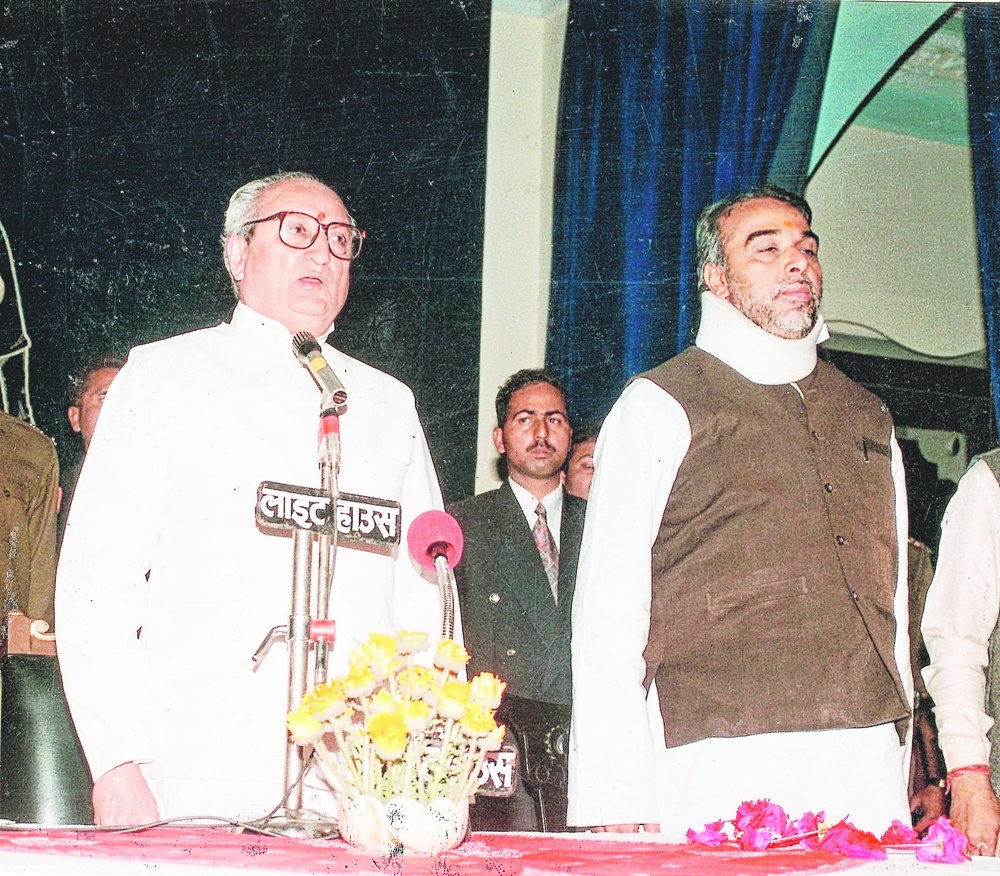
Lucknow, Feb. 12: A trial of strength in the Bihar Assembly, scheduled late next week, over the fate of Jitan Ram Manjhi has put the focus back on Governor Keshari Nath Tripathi, who, as Speaker of the Uttar Pradesh House in the nineties, had presided over similar turbulent times.
Tripathi, who was a legislator in Uttar Pradesh for five terms, became Speaker of the Assembly first in 1991-93, and again during the politically volatile period stretching from 1997 to 2002 and also from May 2002 till 2004.
But it was during the trial of strength of the Kalyan Singh government in February 1998 that Tripathi faced his greatest test.
His role was significant after then governor, Romesh Chandra Bhandari, dismissed the Kalyan government on February 21, 1998, after it had supposedly lost majority following withdrawal of support by the Loktantrik Congress and a break away Janata Dal group, Janata Dal (Pandey).
That very day, Kalyan's transport minister and Loktantrik Congress leader Jagdambika Pal (now a BJP MP) was appointed chief minister by the governor. A furious Kalyan immediately filed a petition against the move in Allahabad High Court.
The governor's decision was apparently taken on the basis of oral promise of support to Pal by the BSP, Samajwadi Party and the Loktantrik Congress.
The court, which declared this appointment null and void on February 23, asked the Kalyan government to go through a floor test through a secret ballot in the UP Assembly on February 26, 1998, which Kalyan won by 29 votes.
Kalyan received 225 votes against Pal's 196 in the then 406-member UP House.
Before this trial of strength, Kalyan was reduced to a minority government having just 197 members, short of six in a House whose majority mark was 204.
Recalling the episode, former UP minister Legislator Satyadev Tripathi said: "This victory of the floor test would not have been possible had not the then Speaker recognised the breakaway groups as Independent entities and also withheld a verdict in an earlier case of 12 rebel BSP legislators against whom the party had sought disqualification."
The groups that were recognised as independent entities were made up of 19 of 37 Congress legislators who formed the Loktantrik Congress and three of Janata Dal members who formed a separate group called Janata Dal (Pandey).
Mayawati 's supporters had demonstrated on the road against this decision.
While Speaker Tripathi defended his decision to recognise these groups as he was "adhering to the principles of House proceedings", Kalyan declared this as "victory of democracy". However, the Speaker came under political and judicial criticism later in 2003 when he recognised another rebel group of 37 BSP MLAs who, defying the party whip, supported the minority Mulayam Singh government.
The first group of the 13 BSP MLAs broke away from the party in August 2003 and later 24 joined them the same year on September 6.
They informed the Speaker through a letter dated September 16.
The Speaker had given them recognition in the House as an independent group and kicked up a political storm.
The BSP moved a petition first in Allahabad High Court and later in the Supreme Court. Allahabad High Court reversed the Speaker's order to recognise the BSP rebels as a separate group.
The Supreme Court, where the case landed after the Speaker made an appeal and was fought by advocate-turned-present BSP Rajya Sabha member Satish Mishra representing his party, also dismissed the order of the Speaker, saying the story of the split "was an afterthought".
The Supreme Court held: "The story of split in the original party (BSP) put forward in letter of September 16 was an afterthought."
On the Speaker's decision, the SC said: "No material was placed before us regarding the formation of a new party."











